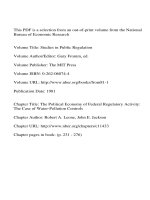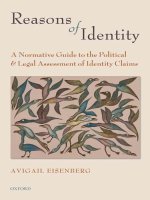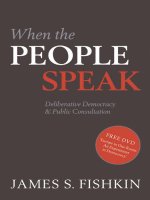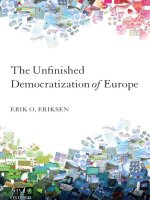- Trang chủ >>
- Khoa Học Tự Nhiên >>
- Vật lý
religious voices in public places nov 2009
Bạn đang xem bản rút gọn của tài liệu. Xem và tải ngay bản đầy đủ của tài liệu tại đây (1.23 MB, 347 trang )
RELIGIOUS VOICES IN PUBLIC PLACES
This page intentionally left blank
Religious Voices
in Public Places
Edited by
NIGEL BIGGAR AND LINDA HOGAN
1
3
Great Clarendon Street, Oxford ox2 6dp
Oxford University Press is a department of the University of Oxford.
It furthers the University’s objective of excellence in research, scholarship,
and education by publishing worldwide in
Oxford New York
Auckland Cape Town Dar es Salaam Hong Kong Karachi
Kuala Lumpur Madrid Melbourne Mexico City Nairobi
New Delhi Shanghai Taipei Toronto
With offices in
Argentina Austria Brazil Chile Czech Republic France Greece
Guatemala Hungary Italy Japan Poland Portugal Singapore
South Korea Switzerland Thailand Turkey Ukraine Vietnam
Oxford is a registered trade mark of Oxford University Press
in the UK and in certain other countries
Published in the United States
by Oxford University Press Inc., New York
# Oxford University Press 2009
The moral rights of the author have been asserted
Database right Oxford University Press (maker)
First published 2009
All rights reserved. No part of this publication may be reproduced,
stored in a retrieval system, or transmitted, in any form or by any means,
without the prior permission in writing of Oxford University Press,
or as expressly permitted by law, or under terms agreed with the appropriate
reprographics rights organization. Enquiries concerning reproduction
outside the scope of the above should be sent to the Rights Department,
Oxford University Press, at the address above
You must not circulate this book in any other binding or cover
and you must impose the same condition on any acquirer
British Library Cataloguing in Publication Data
Data available
Library of Congress Cataloging in Publication Data
Data available
Typeset by SPI Publisher Services, Pondicherry, India
Printed in Great Britain
on acid free paper by
MPG Books Group
ISBN 978 0 19 956662 4
13579108642
Acknowledgements
We record our gratitude here: to the University of Leeds and the British
Academy for funding the international colloquium at the University of
Leeds in June 2003, out of which this book has been built; to Dr Peter
Admirand, then Research Assistant in the School of Religions and Theology
at Trinity College Dublin, who helped prepare the manuscript; and to
the McDonald Agape Foundation for their venturesome support of Nigel
Biggar’s work.
This page intentionally left blank
Contents
Contributors ix
Introduction
Linda Hogan 1
PART I: RELIGION AND PUBLIC REASON:
PHILOSOPHICAL VIEWS
1. Why Can’t We All Just Get Along with Each Other? 17
Nicholas Wolterstorff
2. Citizenship, Religion, and Political Liberalism 37
Raymond Plant
3. Between Postsecular Society and the Neutral State: Religion as
a Resource for Public Reason 58
Maureen Junker-Kenny
PART II: RELIGION AND PUBLIC REASON:
THEOLOGICAL VIEWS
4. Translation, Conversation, or Hospitality? Approaches
to Theological Reasons in Public Deliberation 85
Luke Bretherton
5. Messianic Ethics and Diaspora Communities: Upbuilding
the Secular Theologically from Below 110
P. Travis Kroeker
6. Christian Hope and Public Reason 131
Robert Gascoigne
PART III: RELIGION AND PUBLIC REASON:
PUBLIC POLICY ISSUES
7. Not Translation, but Conversation: Theology in Public
Debate about Euthanasia 151
Nigel Biggar
8. Religious Education and Democratic Character 194
Paul Weithman
9. Religion and Public Reason in the Global Politics
of Human Rig hts 216
Linda Hogan
PART IV: RELIGION AND PUBLIC REASON:
NATIONAL CONTEXTS
10. The Public Presence of Religion in England: Anglican
Religious Leaders and Public Culture 235
Peter Sedgwick
11. Religion, Rhetoric, and Running for Office: Public
Reason on the US Campaign Trail 260
Brian Stiltner and Steven Michels
12. Islam and the Secularized Nation: A Transatlantic Comparison 286
Jocelyne Cesari
Conclusion 309
Nigel Biggar
Index 331
viii Contents
Contributors
NIGEL BIGGAR is Regius Professor of Moral and Pastoral Theology,
and Director of the McDonald Centre for Theology, Ethics, and Public
Life, at the University of Oxford, England. He is also a member of the
Committee for Ethical Issues in Medicine at the Royal College of Physicians
(London). Among his publications are Aiming to Kill: The Ethics of Suicide and
Euthanasia (Darton, Longman, & Todd, 2004) and (ed.) Burying the Past:
Making Peace and Doing Justice after Civil Conflict (Georgetown University
Press, 2001, 2003).
LUKE BRETHERTON is Senior Lecturer in Theology and Politics and
Convenor of the Faith and Public Policy Forum at King’s College London,
England. He is also actively involved in urban politics and developing inter-
faith relations as a civic practice through the work of London Citizens Orga-
nizing. His publications include Hospitality as Holiness: Christian Witness
Amid Moral Diversity (Ashgate, 2006).
JOCELYNE CESARI is Senior Research Fellow and Associate Professor at the
Centre National de la Recherche Scientifique at the Sorbonne, Paris, France;
Research Associate at the Center for Middle Eastern Studies at Harvard
University, where she directs the Interdisciplinary Program on Islam in the
West; and Lecturer on Islamic Studies at Harvard Divinity School. Her most
recent books are European Muslims and the Secular State (Ashgate, 2005) and
When Islam and Democracy Meet: Muslims in Europe and the United States
(Palgrave, 2004).
ROBERT GASCOIGNE is Professor and Head of School at the School of
Theology in the Australian Catholic University. His publications include
Freedom and Purpose: An Introduction to Christian Ethics (Paulist, 2004) and
The Public Forum and Christian Ethics (Cambridge University Press, 2001).
He is a past president of the Australian Catholic Theological Association.
LINDA HOGAN is Professor of Ecumenics and Head of School at the Irish
School of Ecumenics, Trinity College Dublin, the Republic of Ireland. Her
publications include (ed.) Applied Ethics in a World Church (Orbis, 2008),
(co-ed. with Sasha Roseneil) Ethical Relations (Sage, 2003), (co-ed. with Sasha
Roseneil) Gendering Ethics/The Ethics of Gender (Sage, 2001), and Confronting
the Truth: Conscience in the Catholic Tradition (Paulist, 2000). She became a
Fellow of Trinity College Dublin in 2007.
MAUREEN JUNKER-KENNY is Associate Professor in the School of Reli-
gions and Theology at Trinity College Dublin, the Republic of Ireland, where
she is also a Fellow. Among her publications are: (co-ed. with P. P. Kenny)
Memory, Narrativity, Self, and the Challenge to Think God: The Reception
within Theology of the Recent Work of Paul Ricoeur (LIT-Verlag, 2004),
(co-ed. with R. Ammicht-Quinn and E. Tamez) The Discourse of Human
Dignity (SCM, 2003), (ed.) Designing Life? Genetics, Procreation, and Ethics
(Ashgate, 1999), and Argumentationsethik und christliche Praxis: Eine
praktisch-theologische Auseinandersetzung mit der Handlungstheorie Ju
¨
rgen
Habermas (Kohlhammer, 1998).
P. TRAVIS KROEKER is Professor and Chair in the Department of Religious
Studies, McMaster University, Hamilton, Ontario, Canada. His publications
include Christian Ethics and Political Economy in North America (McGill-
Queen’s University Press, 1995) and (with Bruce Ward) Remembering the
End: Dostoevsky as Prophet to Modernity (Westview Press, 2001; SCM
Press, 2002).
STEVEN MICHELS is Associate Professor of Political Science at Sacred
Heart University, Fairfi eld, Connecticut, USA. He is the author of several
articles and chapters on political theory, including ‘When Democracies Fight:
Tocqueville on the Democratic Peace’,inEssays in Arts and Sciences (Winter
2005).
RAYMOND PLANT is Professor of Jurisprudence and Political Philosophy at
King’s College London, England, and a Labour peer who sits in the House of
Lords as Lord Plant of Highfield. He is the author of Politics, Theolog y,
and History (Cambridge University Press, 2001), and he delivered the
2007 Bampton Lectures at Oxford University under the title of ‘Religion,
Citizenship, and Liberal Pluralism’.
PETER SEDGWICK is Principal of St Michael’s College, Llandaff, Wales,
Dean of the Faculty of Religious and Theological Studies at Cardiff Universi-
ty, and Moderator of the Church and Society division of Churches Together in
Britain and Ireland. He is author of Rethinking Sentencing (Church House
Publishing, 2004) and co-author (with Andrew Britton) of Economic Theory
and Christian Belief (Peter Lang, 2002).
BRIAN STILTNER is Associate Professor of Religious Studies at Sacred Heart
University, Fairfield, Connecticut, USA, author of Religion and the Common
Good (Rowman & Littlefield, 1999), and co-author (with David Clough)
of Faith and Force: A Christian Debate about War (Georgetown University
Press, 2007).
x Contributors
PAUL WEITHMAN is Professor of Philosophy at the University of Notre
Dame, Indiana, USA. He is the author of Religion and the Obligations of
Citizenship (Cambridge University Press, 2002) and the editor, most recently,
of Liberal Faith: Essays in Honor of Philip Quinn (Notre Dame University
Press, 2008).
NICHOLAS WOLTERSTORFF is Noah Porter Professor Emeritus of Philo-
sophical Theology, Yale University; and Senior Fellow, Institute for Advanced
Studies in Religion, University of Virginia, USA. He is co-author (with Robert
Audi) of Religion in the Public Square (Rowman & Littlefield, 1997), and
author of Justice: Rights and Wrongs (Princeton University Press, 2008).
Contributors xi
This page intentionally left blank
Introduction
Linda Hogan
Religion has once again re-emerged as a significant force in the public square.
Whereas in the twentieth century it was assumed that religion would become
ever more marginal to political life, the events of the last decade suggest a
more complex reality. The once dominant secularization thesis has had to
be re-thought in light of the evidence that social and technological progress
does not inevitably lead people to abandon ‘the naı
¨
ve superstitions of faith’.
Rather it appears that, around the globe, many people are turning again to
religion, although for the most part they are not returning to the traditional
religious institutions, but instead are attracted to its more informal manifes-
tations. However, nor can one simply conclude that secular world-views are
under threat while religious ones are again on the rise, since there are also
countries like Malta and the Republic of Ireland, once renowned for their
religiosity, where the social and political influence of religion is dramatically
in decline. Rather there is in evidence a complex global political reality, in
which the nature of religion and the character of religious affiliation are
changing and in which one can no longer identify a simple trajectory towards
either secularism or religiosity. Indeed our world is simultaneously secular
and religious, with the political implications of this ambivalent reality evident
across the globe. Secular Turkey now has an Islamist President, Abdullah Gu
¨
l,
while France’s President Nicolas Sarkozy, in a radical departure from the
country’s long-established secular republicanism, has spoken of the need
to allow for a more public role for religion.
1
In the United States, notwith-
standing the constitutional separation of church and state, religious voices
play a significant role in the determination of policy, especially relating to
family, gender, and reproduction, while in many Asian, African, and South
1
Late in 2007 and throughout 2008 President Nicolas Sarkozy made a number of speeches in
which he elaborated his view of the role religion ought to play in political life. The most
significant of these were at the Lateran Church of St John, Rome, on 20 December 2007 and
in Riyadh on 14 January 2008 before the Saudi Arabian Consultative Council.
American countries the political influence of the more informal strands of
evangelical Christianity and fundamentalist Islam is growing even as the
influence of the more established denominations is in decline.
Alongside this resurgence of religion is the parallel phenomenon of the
reassertion of violent religion. We see examples of this in India, Sri Lanka,
Nigeria, Israel–Palestine, and the Balkans, although in each case religion is
but one among a myriad of factors fuelling political conflict. Indeed the presence
of violent religion, in its local and global forms, has fuelled what The Economist
has called a ‘secular fury’ against religion.
2
Associated with analysts like Chris-
topher Hitchens,
3
Sam Harris,
4
and Richard Dawkins,
5
this perspective lays at
religion ’s door the blame for much political turmoil worldwide and regards it as
ultimately pernicious in nature. Nor is this negative assessment limited to
violent religion; rather it is a charge laid against all religion, with sexism and
the persecution of minorities, including sexual minorities, being named as
examples of its destructive influence. According to this view the real clash of
civilizations is between the superstition of religion and the enlightenment of
modernity. Moreov er, in this perspective the hope for humankind resides
therefore in the abandonment of religious world-views in their entirety, and,
in the interim, in the banishment of religion to the private realm.
Even the most tolerant of secular liberals tend to prefer a political order in
which religion plays a predominantly private, rather than a public role.
However, for most religious believers religion is inescapably political and
cannot meaningfully be relegated to the private realm. In common with
citizens who have no religious affiliation, religious believers expect to have
the opportunity to express their views on matters of critical public interest
within the usual deliberative processes of the polis. Nor is it clear that the
unambiguous distinction between the public and the private can be sustained
in the terms advocated by many secularists. It is difficult, perhaps impossible,
to delineate where the public and private realms begin and end. Moreover,
many of the pivotal issues on which the debates about the political influence
of religion revolve are precisely those that cannot be easily categorized thus.
Few issues are more obviously simultaneously political and private than
abortion, euthanasia, or gay marriage. Thus notwithstanding the risks to
the polity posed by intolerant or violent religion, the solution cannot be
2
This is a phrase used in The Economist in its special repor t on religion and public life, 3
November 2007, 4.
3
Christopher Hitchens, God is Not Great: How Religion Poisons Everything (New York:
Twelve, 2007).
4
Sam Harris, The End of Faith: Religion, Terror and the Future of Reason (New York: W. W.
Norton, 2004).
5
Richard Dawkins, The God Delusion (Boston: Houghton Mifflin, 2006).
2 Linda Hogan
the privatization of religion. Such a remedy finds no resonance among the
self-perception of the majority of religious believers, and conflicts with the
dominant understanding of the nature of political participation.
1. THE FACT OF PLURALISM
This present age is characterized, not by the triumph of either religious or
anti-religious world-v iews, but rather by the fact of religious pluralism.
Charles Taylor’s A Secular Age
6
maps the political and philosophical contours
of the journey from a society in which belief in God was unchallenged to one
in which it is one option among many, arguing that if one can talk of this age
as being a secular one it can only be in terms of religious uniformity ceding to
religious pluralism. For Taylor the most significant element in understanding
the manner in which our world can be called secular lies in the changed nature
of belief. There has been, he claims, a modification of what it means to believe.
Thus the critical factor globally today is that ‘belief in God is no longer
axiomatic [that] there are alternatives’.
7
Believers and unbelievers alike
live with the fact of religious pluralism and have to cope with both its
theological significance as well as its political ramifications. According to
Taylor we inhabit a global context which contains different milieux, ‘within
each of which the default option may be different from others, although the
dwellers within each are very aware of the options favoured by the others, and
cannot just dismiss them as an inexplicable exotic error’.
8
‘Secularity in this
sense is a matter of the whole context of understanding in which our moral,
spiritual and religious experience and search takes place.’
9
It is true that that many public spaces have been emptied of any reference to
God (in contrast to earlier times), and that there is a falling off in religious
belief and practice (at least in some parts of the world). However, although
these factors are pertinent to our discussion, it is the plural nature of the
presence of religion, and the fact that all citizens—and especially religious
believers—have to contend with that pluralism, that makes the debate about
the role of religious voices in the public square so critical, and so contested. In
every jurisdiction one can discern the political implications of this religious
pluralism, especially in policy debates on issues such as education, health, and
family law. In Europe, debates about the political implications of religious
6
Charles Taylor, A Secular Age (Cambridge, Mass.: Belknap Press of Harvard University
Press, 2007).
7
Ibid. 3.
8
Ibid. 21.
9
Ibid. 3.
Introduction 3
pluralism are affected by the multiplicity of institutional arrangements be-
tween individual states and the various majority and minorit y faiths repre-
sented therein. Moreover the construction of the EU as a political entity has
also provided the occasion for a re-energized debate about the role of religion
in the liberal polity,
10
with the case for Turkey’s admission to the EU being
especially contentious. In the United States the issues debated mirror those
that preoccupy Europe, whereas in Asia and in the Arab world, although a
different dynamic is in play, nonetheless the common concerns of education,
health (especially at the beginning and end of life), and human rights are
among the issues through which the debate about the proper role of religion
in public life is conducted. Thus despite certain regional particularities we
can discern a certain commonality in respect of the issues through which the
role of religious voices in the public square is considered.
The fact of religious pluralism raises a number of sensitive political ques-
tions for each state, among the most important being the extent to which the
common good requires the regulation of particular religious practices (espe-
cially those that may be regarded as discriminatory or repressive of indivi-
duals within the communities in question), and the extent to which a society
should adapt its existing norms and legislative provisions to accommodate
religious practices that are untypical of those of the host communities. The
controversy evoked by the Archbishop of Canterbury’s suggestion that British
society needs to have a debate about how it could accommodate some aspects
of Sharia law is an example of just how contentious such issues have be-
come.
11
States deal differently with these fundamental political questions,
with a variety of approaches observable worldwide. In liberal democracies, two
dominate: the assimilationist approach, most strongly associated with France,
with its republican ideal of laı
¨
cite
´
; and various versions of a multiculturalism,
typical of the Netherlands, Belgium, the United Kingdom, Canada, and the
United States.
12
In spite of the differences of emphasis both approaches share
some fundamental assumptions, including a separation of the spheres of
10
See for example ‘Degre
´
de modernite
´
des e
´
tats en Europe’, Revue d’e
´
thique et de the
´
ologie
morale, Le Supple
´
ment, 226 (September 2003); ‘Religions et nations’, Revue d’e
´
thique et de
the
´
ologie morale, Le Supple
´
ment, 228 (March 2004); and Ju
¨
rgen Habermas, ‘Vorpolitische
Grundlagen des demokratischen Rechtsstaats?’, in Zwischen Naturalismus und Religion (Frank
furt: Suhrkamp, 2005), 106 18.
11
For the full text of the interview given by Archbishop Rowan Williams on 7 February 2008
see < />12
See the various essays in Stefan Heuser and Hans Ulrich (eds.), Pluralism in Europe? One
Law, One Market, One Culture?, Proceedings of the Annual Conference of the Societas Ethica in
Ljubljana, August 2004 (Mu
¨
nster: Lit, 2006); Marie Jo Thiel, Europe, spiritualite
´
s et culture face
au racisme (Mu
¨
nster: Lit, 2004); and Islam and Enlightenment: New Issues, Concilium 2005/5
(London: SCM, 2005).
4 Linda Hogan
religion and politics (although this does not necessarily imply an unambigu-
ously formal separation of church and state); a constitutional democratic
government; the presence of multiple religious communities; and a thriving
civil society in which policy issues are debated. In Islamic and Muslim
majority states the proper role and functioning of religion is also of concern,
although the framework in which even the most fundamental questions are
posed, and the political options delineated, is very different. Currently dom-
inating public discourse is the view that an Islamic state involves an Islamic
religious establishment, on the ground that it is the responsibility of rulers
to put in place an order that will secure peace with justice.
13
The theological
rationale for this conclusion is developed especially by a number of twentieth-
century theorists, including the Egyptian intellectual Sayyid Qutb, whose
position is discussed in Nicholas Wolterstorff’s chapter in this volume. None-
theless there are alternative voices, beginning with Ali ’abd al-Raziq,
14
who
argue for the development of new forms of Islamic governance that
are consonant with many of the features of modern life, and especially with
the fact of religious pluralism.
15
2. THE LIBERAL PUBLIC SQUARE
The political context with which this volume is concerned is that of the liberal
polity, within which the question of the role of religion in public debate takes
on a particular hue. The essays herein recognize that within liberal democ-
racies the formal arrangements between church and state may vary, as for
example between the USA which imposes a formal separation, and England
and Scotland where there are established churches. Notwithstanding these
differences however, what characterizes the political contexts with which we
are here concerned is the conviction that the state has an obligation to manage
13
Here I rely on an unpublished paper by John Kelsay entitled ‘The Christian Sources of
Liberal Democracy: An Islamic Perspective’, which was presented at the conference ‘The
Christian Sources of Liberal Society’, held at Trinity College Dublin in June 2006.
14
Ali ’abd al Raziq, Al Islam wa usul al hukm (Islam and the Fundamentals of Government),
is available in a French translation by Abdou Filali Ansery, L’Islam et les fondements du pouvoir
(Paris: E
´
ditions de la De
´
couverte, 1994). Further details are available in John Kelsay, Arguing the
Just War in Islam (Cambridge, Mass.: Harvard University Press, 2007), 239.
15
See for example Abdulazziz Sachedina The Islamic Roots of Democratic Pluralism (New
York: Oxford University Press, 2001) and Hamid Enayat, Modern Islamic Political Thought
(Austin: University of Texas Press, 1982).
Introduction 5
the reasonable pluralism (including religious pluralism) that inevitably occurs
in democratic societies, and that it ought to do so in a manner that supports
‘the underlying ideas of citizens as free and equal persons and of society as a
fair system of cooperation over time’.
16
Within this context it is reasonable to
expect that citizens, motivated by different theological and philosophical
world-views, will forward a diversity of perspectives on the meaning and
purpose of human existence; on the values by which individuals ought to
live their lives; and on the nature of the human goods by which a society
ought to order itself. Moreover the paradigmatic model has come to be
the Rawlsian one, which proposes an understanding of liberalism in which
any viable conception of justice must ‘allow for a diversity of general and
comprehensive doctrines, and for the plurality of conflicting, and indeed
incommensurable, conceptions of the meaning, value and purpose of
human life [or what Rawls calls for short “conceptions of the good”] affirmed
by citizens of democratic societies’.
17
Given, as Rawls sees it, the political fact
of the incommensurability of these diverse conceptualizations of the good,
and that there is no political basis on which citizens can adjudicate among
them, a well-ordered society must develop a political conception of justice
(namely justice as fairness) which is independent of and free from any
consideration of the good.
Rawls is confident that the liberal polity can forge ‘an overlapping consen-
sus’ on fundamental political matters among people with diverse religious
and philosophical commitments. The means by which this is achieved in the
Rawlsian polity is by public reason, namely a process by which citizens replace
their comprehensive doctrines of truth or right with an idea of the politically
reasonable addressed to citizens as citizens.
18
Moreover, underlying the con-
cept of public reason is the criterion of reciprocity, namely a commitment by
which ‘viewing one another as free and equal in a system of social cooperation
over generations, [citizens] are prepared to offer one another fair terms of
cooperation according to what they consider the most reasonable conception
of political justice; and . . . agree to act on those terms, even at the cost of their
own interests in particular situations, provided that other citizens also accept
those terms’.
19
16
John Rawls, ‘The Idea of Public Reason’, reprinted in The Law of Peoples (Cambridge,
Mass.: Harvard University Press, 1999), 141.
17
John Rawls, ‘The Idea of an Overlapping Consensus’, Oxford Journal of Legal Studies, 7/1
(1987), 4.
18
Rawls, ‘The Idea of Public Reason’, 132.
19
Ibid. 136.
6 Linda Hogan
3. RELIGIOUS VOICES IN THE
LIBERAL PUBLIC SQUARE
The concept of public reason is fundamental to Rawls’s understanding of how
the just and equitable liberal democracy ought to function. Public reason
specifies ‘at the deepest level the basic political values and specifies how the
political relation is to be understood’.
20
More explicitly public reason is the
form of reasoning that citizens ought to adopt when they deliberate on
matters of constitutional essentials and on matters of basic justice. In short
it is the mode through which political deliberation on the most significant of
issues ought to be pursued. Within this framework a form of public reason is
regarded as essential because the mutual incompatibility of comprehensive
doctrines is presumed. Moreover it is assumed that the differences among
these comprehensive (including religious) doctrines can only be managed by
the systematic reservation of such doctrines, that is, by ensuring that they are
aired only either in private or in the background culture of civil society.
However, Rawls does enter a caveat here in that he accepts that citizens
may introduce aspects of their comprehensive doctrines, religious and non-
religious, into political discussion at any time, ‘provided that, in due course,
we give properly public reasons to support the principles and policies our
comprehensive doctrine is said to support’.
21
Rawls calls this ‘the proviso’.
Whether and how far the concept of public reason resonates with theologi-
cal (especially Christian) understandings of the liberal polity and Christian-
ity’s role therein is the central preoccupation of this collection. It is addressed
from a number of theological and philosophical perspectives, through a range
of issues in public policy, and in a variety of national polities. Each of the
authors considers the extent to which responsible dialogue involves the
systematic reservation of religious doctrines, or not. It probes too the under-
lying question of whether religious, or other metaphysically committed
speech, is indeed unintelligible to non-believers, as many proponents of
political liberalism would have us believe. The contributors attend to the
issue of how consensus can be achieved, many challenging the Rawlsian
assumption that the route to such agreement on constitutional essentials
and matters of basic justice is via (Rawlsian) public reason. Indeed, running
throughout the volume is an affinity for approaches that believe that the route
to a durable political culture lies in serious and systematic engagement with
different, and even opposing, comprehensive doctrines.
20
Ibid. 138.
21
Ibid. 144.
Introduction 7
(a) Religion and public reason: philosophical issues
All of our essayists share the view that the context in which liberal societies
must function is one in which there is no prospect of religion disappearing, or
of citizens agreeing on the fundamental principles of justice and of social
order. From this shared diagnosis this collection proceeds to consider the
relationship between religion and politics in the liberal polity, first of all, by
foregrounding a set of philosophical questions. Of primary importance here
is the question of ‘which principles of social organization must a non-
confined exclusivist religion affirm if it is to embrace a liberal democratic
polity for a society in which there are other such religions’.
22
Nicholas
Wolterstorff, Raymond Plant, and Maureen Junker-Kenny all consider this
fundamental issue, each maintaining a confidence in the liberal polity, but
each also, for different reasons, rejecting the view that Rawls’s overlapping
consensus, advanced through public reason, is the way to identify such
principles. Indeed, notwithstanding his evident support for the liberal polity,
Wolterstorff rejects the Rawlsian, Rortian, Hickian, Kantian, and Derridean
proposals, while Junker-Kenny and Plant conclude that the procedural ap-
proach of Rawls cannot secure the allegiance of those for whom religion is the
fulcrum of their moral ideals. Plant’s subtle paper highlights the paradox
within Rawlsian liberalism, which is reluctant to accept a comprehensive or
perfectionist justification of the liberal political order, but which is nonethe-
less committed to particular (comprehensive) principles such as liberty and
equality. In his essay entitled ‘Citizenship, Religion, and Political Liberalism’
he is not only critical of the pragmatic approach of Rawls, but also pessimistic
about the prospect of a more comprehensive, perfectionist liberalism being
able to provide the basis for an overlapping consensus.
Instead of the Rawlsian framework, Junker-Kenny prefers that of Haber-
mas, especially as evident in his most recent work. She argues that Habermas
endorses a form of deliberative politics in which citizens are not expected to
reserve their systematic doctrines, but rather to explain and translate them.
23
She has reservations about the adequacy of translation as a mode of engage-
ment, however. Nonetheless she finds much within his analysis to give
comfort to those who recognize the legitimacy of the presence of religious
voices in the public square. This concern with whether there are, within each
religion, resources for affirming the basic principles of the liberal polity arises
22
Nicholas Wolterstorff’s analysis in ‘Why Can’t We All Just Get Along with Each Other?, p. 26
below.
23
Maureen Junker Kenny, ‘Between Postsecular Society and the Neutral State: Religion as a
Resource for Public Reason’, p. 76 below.
8 Linda Hogan
for Plant too. His response lies in a natural law approach in which one would
probe ‘whether there is some kind of common, shared moral and political
space for reasoning about the nature of goods that have to be presupposed by
any comprehensive doctrine’.
24
Wolterstorff too is exercised by this issue since
he is firm in his conviction that the stability of liberal democracy depends, not
on the ability and willingness of citizens to appeal to public reason, but rather
on ‘the great majority having reasons based on their own perspectives for
accepting the principles of political organization’ that are fundamental to a
liberal polity.
25
Wolterstorff does not explicitly endorse the natural law
proposal of Plant, or the universal morality idiom of Junker-Kenny. Yet in
his conclusion one can see affinities with these other essayists when he speaks
about the moral basis of democracy consisting in the protection of rights,
which, in turn, is grounded in the worth of persons—that is, in something
that all human beings share.
(b) Religion and public reason: theological issues
How Christians should engage political liberalism, particularly that of the
Rawlsian kind, is the primary focus of Part II. In his ‘Translation, Conversa-
tion, or Hospitality?’ Luke Bretherthon dismisses both the translation mode
advocated by Rawls and Habermas, as well as the conversation mode pro-
posed by MacIntyre. Although Bretherton is sympathetic to many aspects of
the latter, which he regards as a model that attempts to take seriously the
particularities of different traditions, he concludes that the MacIntyrian
version of conversation is ultimately unsuccessful. This is because, he claims,
MacIntyre gives no account of how the process of conversation is possible
when there are significant power differentials between various traditions,
either in terms of access to the public square or in terms of a historical affinity
with particular forms of public engagement. Instead, he regards Stout’s
prescription as the most hopeful, and he sees his own ‘hospitality’ model as
a development of Stout’s proposal that ‘a common morality can only be
achieved by gradually building discursive bridges and networks of trust in
particular settings’.
26
The hospitality model ‘attempts to make explicit the
commitments implicit in a community’s practices as an aid to self-reflective
understanding’,
27
while seeing the embodied practices of distinct traditions
24
Raymond Plant, ‘Citizenship, Religion, and Political Liberalism’, p. 56 below.
25
Wolterstorff , ‘Why Can’t We All Just Get Along with Each Other?’, p. 35 below.
26
Luke Bretherton, ‘Translation, Conversation, or Hospitality’, p. 96 below.
27
Jeffrey Stout, Democracy and Tradition (Princeton: Princeton University Press, 2004), 12.
Introduction 9
as being, in themselves, direct contributions to deliberation about the com-
mon good.
28
While Travis Kroeker’s messianic ethics also focuses on the embodied
practices of communities as the way in which Christians can best engage
in the public square, his assessment of the nature of that secular public
square is far more negative. Indeed he argues that ‘the notions of neutral
technology and juridical state sovereignt y that underlie current conceptions
and embodiments of the secular are themselves dangerously totalitarian,
exclusivist, and violent, even while hidden beneath the veneer of progressivist
liberal assumptions’.
29
Reminiscent of the compelling analysis of both Stanley
Hauerwas and Grace Jantzen, that the political formations of modernity
are based on the production and denial of death,
30
Kroeker argues that the
Christian diasporic ethic ought to be neither isolationist nor accommoda-
tionist, but rather ought to live out of a moral orientation towards a
shared shalom. Inevitably this means not being coerced into the adoption of
a contrived language of public reason. Instead it involves religious and
other citizens in a form of political deliberation pursued through their own
languages, while also ‘learning the languages of others in order to communi-
cate about the shared good’.
31
Robert Gascoigne begins his reflection from a different place, arguing that
Christians can bear witness to their religious identity and discern the ethical
and political meaning of their faith without imposing the content of that faith
on others. Meditating specifically on the virtue of Christian hope, Gascoigne
argues that service to others in a shared historical existence is an expression of
Christian identity and that an explicitly Christian hope can be expressed in
three key ways: a discernment of human capacities that evoke moral virtue; a
conviction of the openness of the future to human striv ing; and a certain
detachment from the fruits of that striving.
32
Gascoigne’s analysis presents yet
another model for Christians within the liberal polity. This is focused neither
on the practices of local communities, nor on the prophetic witness of
diasporic communities, but is rather based in the conviction that Christians
can maintain their transcendent witness through the virtue of hope, and
especially in its expression of solidarity and service of others.
28
Bretherton, ‘Translation, Conversation, or Hospitality’, p. 109 below.
29
Travis Kroeker, ‘Messianic Ethics and Diaspora Communities: Upbuilding the Secular
Theologically from Below’, p. 116 below.
30
See most recently Stanley Hauerwas and Romand Coles, Christianity, Democracy and the
Radical Ordinary (Eugene, Oreg.: Cascade Books, 2008); and Grace M. Jantzen, Foundations of
Violence (London: Routledge, 2004), 10.
31
Kroeker, ‘Messianic Ethics’, p. 126 below.
32
Robert Gascoigne, ‘Christian Hope and Public Reason’, p. 132 below.
10 Linda Hogan
(c) Religion and public reason: public policy issues
and national contexts
Parts III and IV consider these philosophical and theological issues as they
find expression in controversies about public policy and in different national
political contexts. In Part III the policy issues of religious education, eutha-
nasia, and human rights are discussed, while in the final part controversies in
a variety of national polities are considered, namely: the formal role of
Anglican religious leaders in the UK parliament; the role that religion played
in the US presidential election campaigns of 2008; and the political role
of Islam in democratic societies, European and North American.
The essays in Part III share a conviction that the presence of explicitly religious
voices enhances rather than diminishes the nature and quality of political debate.
Each is also aware, however, of the limits of such speech and of the fact that all
citizens,including religiously motivated ones, shareinresponsibility forensuring
that the norms of civility and mutual respect are kept in view at all times. Paul
Weithman’s ‘Religious Education and Democratic Character’ argues that a reli-
giously based education actually inculcates, albeit with a different rationale, the
norms that ground deliberative democracy. In ‘Not Translation, but Conver-
sation: Theology in Public Debate about Euthanasia’, Nigel Biggar probes the
question of whetheror not theological arguments about this controversial public
issue are accessible to non-Christians. Biggar makes a theological argument
against the introduction of euthanasia, and then goes on to reflect on the nature
of that argument, askingifand inwhat ways such religiously based arguments can
contribute bothto political deliberation, and ultimately toconsensusonpolicy,in
its own terms. His conclusion is that ‘public discourse should not require the
translation of theology into secularist language’, but rather ‘should allow contex-
tually sensitive, dialectical, improvisational, candid conversation about public
goods between genuinely different points of view, which articulate themselves in
their own terms while seeking to be persuasive to others’.
33
However he enters
a caveat, in line with the spirit of Bretherton and Gascoigne—namely that ‘if
fruitful conversation does not need a common language or a uniform public
reason (beyond the terms of public goods), it does need a common manner or a
public reasonableness. It needs a shared ethic of communication, a shared
commitment to care more for the truth than the ego, and to care at once for the
truth and for the dignity of those who seem not to recognize it. And it needs a
shared belief that this human dignity actually exists.’
34
33
Nigel Biggar, ‘Not Translation, but Conversation: Theology in Public Debate about
Euthanasia’, p. 192 below.
34
Ibid.
Introduction 11
The final essay in this section takes the discussion from the national to
the global political forum. In ‘Religions and Public Reason in the Global
Politics of Human Rights’ Linda Hogan considers the existing language
of global political debate—that is, that of human rights—and assesses
its potential. She argues that ‘althoug h traditional human rights language
operated as a version of public reason (expecting eventually that individuals
would abandon their comprehensive doctrines), this understanding of
human rights discourse has been modified significantly in the twentieth
century. Moreover she claims that ‘contemporary human rights discourse is
more properly understood as a language of situated individuals who carry
with them their comprehensive doctrines . . . [and that] as it moves from being
a global version of public reason to being a deliberative discourse, it is fit
for the task of generating a variegated and nuanced consensus on matters of
basic justice and constitutional essentials in the global public square, and as
such is worth supporting’.
35
Following consideration of the concrete policy issues of religious educa-
tion, euthanasia, and human rights, the final part of this collection focuses on
controversies where the question of the significance of religious affiliation has
been central, as these have arisen in a variety of national polities. These three
essays, while dealing w ith different national jurisdictions, focus on the ways in
which different religious actors conceptualize the relationship between reli-
gious belonging and the exercise of some form of political influence. Peter
Sedgwick considers the case of England, where Anglican bishops have a role in
the legislature through their participation in the House of Lords. He con-
cludes that the English experience demonstrates that holders of comprehen-
sive doctrines can indeed participate fully in public and political life, while
respecting the requirements of public reason, through respect for the
criterion of reciprocity. Brian Stiltner and Steven Michels look at the United
States. They analyse aspects of the presidential races of 2008, focusing on
how various candidates express, comment on, and make use of their
religious affiliation, and consider how this has been theorized and politicized.
Their conclusion is that on balance ‘candidates’ religious ideals, rationales,
and motivations should be out in public view, if [the candidate] thinks
them relevant’.
36
Moreover they conclude that the four candidates they
studied—namely Barack Obama, Hillary Rodham Clinton, John McCain,
and Mitt Romney—‘did not v iolate the basic requirements of Rawlsian public
35
Linda Hogan, ‘Religions and Public Reason in the Global Politics of Human Rights’, p. 225
below.
36
Brian Stiltner and Steven Michels, ‘Religion, Rhetoric, and Running for Office: Public
Reason on the US Campaign Trail’, p. 284 below.
12 Linda Hogan









